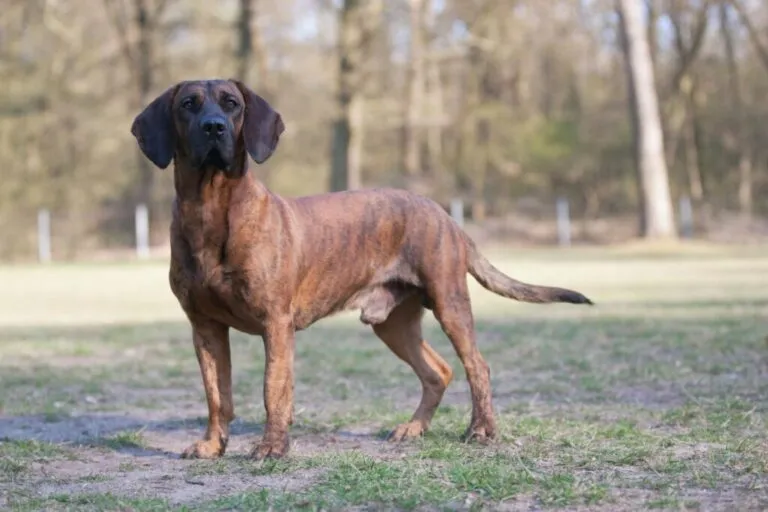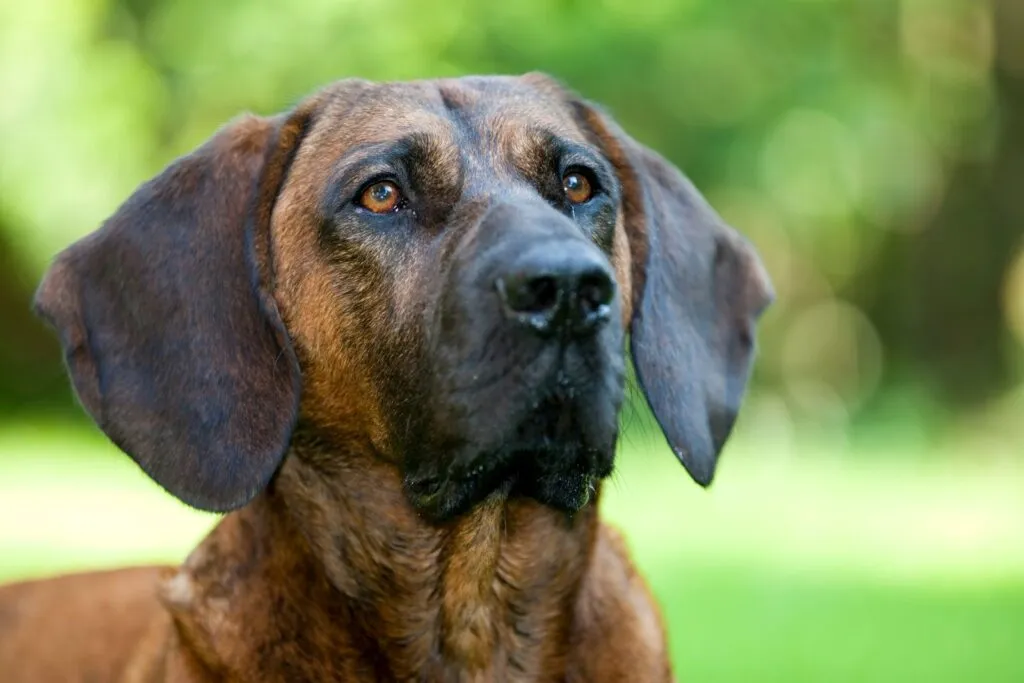Medium Size Poodle
A Hanover Hound is a popular companion for hunters or the search and rescue services. This is mainly due to its fine sense of smell and passion for retrieval. When it isn't busy tracking, it is even-tempered, gentle and friendly. Find out in our breed description what you should offer these dogs in return.

© Constantin / stock.adobe.com
The Hanover Hound is an asset to hunters and experienced dog owners.
| Breed information: | The Hanover Hound is a medium-sized, strong thoroughbred bloodhound, which puts all its strength, endurance and devotion into tracking work. Besides hunting, this breed is calm and friendly. |
| Shoulder height: | 48 – 55cm |
| Weight: | 25 – 40kg |
| Average life expectancy: | 10-14 years |
| Price: | From several thousand pounds upwards, possibly exceeding £5000. |
| Nature: | Pronounced hunting instinct, calm, friendly, intelligent, affectionate |
| Fur: | Short and thick |
| Fur colour: | Light to dark deer red, more or less brindled, with or without facial mask |
| Training requirements: | Low |
| Care requirements: | Low |
| Exercise requirements: | High |
| Origin: | Germany |
The forehead is slightly wrinkled and the dark eyes sparkle expressively: a Hanover Hound, sometimes also known as a Hanoverian Hound, typically looks serious.
This isn’t surprising: After all, this bloodhound breed has an important job to complete. Hanover Hounds are pros at tracking injured animals and are assisted by their broad nose with wide-open nostrils.
Hanover Hounds are a medium-sized dog breed. They can grow between 48 and 55 centimetres in size and reach between 25 and 40 kilograms in weight.
Since running is also one of their tasks, Hanover Hounds are well-proportioned and powerfully built. Their limbs are strong and muscular, and the chest is broad and deep, so that these four-legged friends don’t get out of breath even when covering long distances in the woods.
Another typical feature of Hanover Hounds are their high-set floppy ears, which hang down close to their head and are bluntly rounded at the bottom.
 © Constantin / stock.adobe.com
© Constantin / stock.adobe.com
Typical of the breed is a red base colour, which ranges from light to dark deer red and may be more or less brindled. There are dogs with or without a facial mask, whilst those with small white markings on the chest are still considered true representatives of this dog breed.
The Hanover Hound’s fur is short, thick and coarse. It is somewhat longer and coarser only on the rear edge of the thighs and the lower side of the tail, which is set high and slightly curved with Hanover Hounds.
This breed is classed as a bloodhound. ‘Blood’ refers to the blood of game that has been shot or injured in traffic.
Dogs pick up this ‘blood track’ and help hunters to find game after it has been shot. This is also referred to as retrieval.
A Hanover Hound is an intelligent thoroughbred bloodhound. It carries out its work passionately and with full commitment. When doing so, it benefits from its strong concentration ability and pronounced hunting instinct. It is also defined by its calm and confident nature.
However, this doesn’t mean that bloodhounds only think of hunting 24/7. On the contrary, they seek out affection from and proximity to their owner after completing their work.
The Hanover Hound is quite reserved and discerning towards strangers and won’t cuddle with just anyone. On the other hand, it is friendly and open towards other dogs.
Thanks to its intelligence and composure, the Hanover Hound is easy to train. It radiates calm and expects this from its owner too when training – as well as a certain degree of experience. Hence, these professional hunting dogs aren’t suitable for beginners not in the hunting profession.
 © © Constantin / stock.adobe.com
© © Constantin / stock.adobe.com
A Hanover Hound isn’t just easy to care for due to its inner values. This attractive four-legged friend’s short fur also makes it easier to handle:
There is a large selection of care products available for your dog in the zooplus online store.
With its calm demeanor and strong character, the Hanover Hound makes an excellent new family member, but only if you are prepared to meet its special needs.
This breed won’t be happy in a city apartment. Instead, it needs an environment in which it can pursue its favourite activities. It is happiest in close proximity to woods and nature, where it can carry out the tasks that it was originally bred for.
Experienced families of hunters, police officers or members of a rescue dog association can offer the Hanover Hound the necessary tasks and level of activity that it requires on a daily basis.
Bloodhounds are hunting specialists trained in retrieval by their breeders. To keep them sharp, they need experienced owners who can provide them with regular tasks, such as hunting or search and rescue.
Hence, the Hanover Hound needs to be regularly challenged and to get plenty of exercise. For the often energy-sapping missions involved with hunting or rescue operations, dogs and owners need a high level of fitness, which you can maintain with dog sport like man-trailing.
Since the job of bloodhounds is physically very demanding, their breeders make sure they are in robust health. There are no known frequently occurring hereditary diseases that affect Hanover Hounds.
In order to guarantee a healthy breed, breeders regularly examine their charges for ailments such as hip dysplasia and only allow healthy dogs to take part in breeding.
If kept in a species-appropriate way with diligent care, your Hanover hound will reach 10 to 14 years of age. On average, most dogs of this breed reach 12 years of age.
The Hanover Hound is a German dog breed and emerged almost unchanged from the so-called leader of the pack. This hunting dog breed from the Middle Ages was considered to have a particularly good sense of smell. It is assumed today that it was a German Hound.
When firearms became an integral part of hunting, the requirements of the leader of the pack also changed. Hence, it was developed into a bloodhound, which from then on was bred for tracking down big game that had been shot.
In the 17th century, the royal House of Hanover founded the Jägerhof, an elite school where both hunters as well as horses and hunting dogs learnt the art of hunting. The stature and colour of bloodhounds was further developed at the Jägerhof.
The Hirschmann Association has overseen this dog breed since 1894 with the aim of maintaining pedigree breeding. Shortly after the association was founded, the name Hanover Hound, which is still known to this day, was coined for these Hanoverian dogs.
The Bavarian Mountain Hound originated from crossing Hanover Hounds and German Hounds. Although it looks physically similar to the Hanover Hound, the southern German variety is smaller and more mobile, therefore better suited to working in the mountains.
In the United Kingdom, the traditional way to obtain a Hanover Hound is through the Hanoverian Hound Society (HHS), dog shows or online search (e.g. breeder directories).
A Hanover Hound currently costs from several thousand pounds upwards, possibly exceeding £5000. For this price, you get a staunch and robust dog guaranteed to meet the breed standards.
The hurdles of owning a Hanover Hound are significant. Although these dogs are easy to groom and train, they pose significant requirements in terms of housing.
However, if you have experience with hunting or rescue dogs and can offer a four-legged friend regular missions, a Hanover Hound makes a perfect companion for you and your family.
Here are some purchase proposals curated by the zooplus editorial team
The products featured have been carefully selected by our editorial staff and are available at the zooplus online pet shop. The selection does not constitute advertising for the mentioned brands.
Fans of the Bearded Collie agree that those who aren't familiar with this dog breed simply have to get acquainted with it. And those who have experienced how a Bearded Collie bolts across meadows with its flowing fur, how it rolls around full of energy and joy and how it attentively and observantly takes into account its owners wishes become simply addicted to this original dog breed and its unique charm.
The Goldendoodle isn't a breed, but a pairing between Golden Retrievers and Medium or Standard Poodles. Marketed as a low-maintenance dog for allergy sufferers, this hybrid is enjoying increasing popularity amongst dog lovers, similar to the Labradoodle.